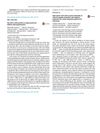2,3,7,8-Tetrachlorodibenzo-p-dioxin Increases the Expression of Genes in the Human Epidermal Differentiation Complex and Accelerates Epidermal Barrier Formation
August 2011
in “
Toxicological sciences
”

TLDR TCDD speeds up skin barrier formation by increasing certain gene expressions.
The study investigated the effects of 2,3,7,8-tetrachlorodibenzo-p-dioxin (TCDD) on human epidermal differentiation and barrier formation. It was found that TCDD exposure led to increased expression of several prodifferentiation genes, including filaggrin (FLG), by activating the aryl hydrocarbon receptor (AHR) which binds to specific DNA regions upstream of these genes. This activation resulted in enhanced transcription of these genes, as confirmed by reporter assays and immunoblot assays. Additionally, in utero exposure to TCDD accelerated epidermal barrier formation in mouse fetuses by approximately 1 day. The findings suggested that the epidermal permeability barrier is a functional target of TCDD-activated AHR, providing insights into the mechanisms underlying chloracne pathology.

